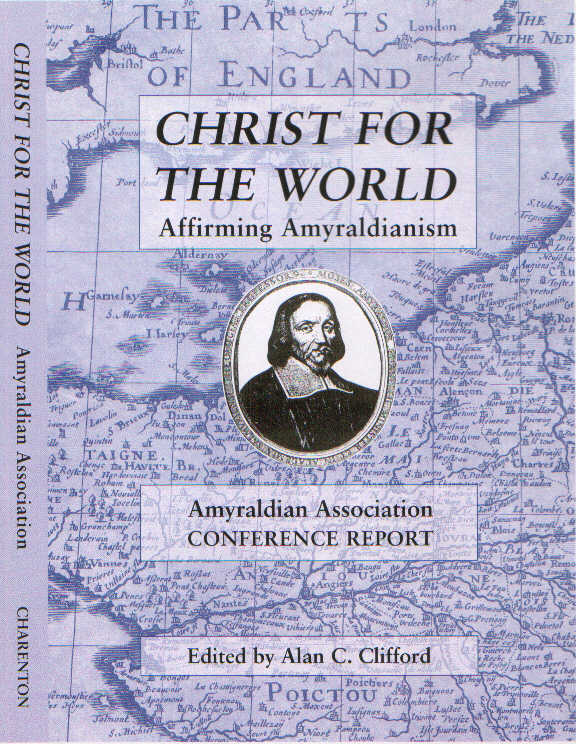CHRIST FOR THE WORLD
To purchase using PayPal/credit/debit card (a new window will open
CHRIST FOR THE WORLD
Affirming Amyraldianism
Available April 2007
Papers given at the 4th Amyraldian Association Conference held at Attleborough, Norfolk on 5-6 April 2006
Editor: Dr Alan C. Clifford
173 pages £9. 95 (p & p extra)
Charenton Reformed Publishing, 8 Le Strange close, Norwich NR2 3PN, UK
ISBN 978-0-9555165-0-4
CONTRIBUTORS
David F. Bond is a Jewish Studies specialist engaged in Jewish outreach in London
Alan C. Clifford is Pastor of Norwich Reformed Church and an author
David Llewellyn Jenkins is an author and professional writer living in Norfolk
J. E. Hazlett Lynch is a former Presbyterian minister and Director of West Tyrone Voice
Stephen M. Quinton is Assistant Pastor of Norwich Reformed Church and a teacher
J. Nigel Westhead is Assistant Vice Principal of Trinity Academy, Doncaster
PUBLISHER’S FOREWORD
The following papers from the 2006 Conference explore different aspects of Amyraldian theology. Placed before his largely-biographical account of Amyraut, it was considered appropriate and helpful to include Dr Clifford’s 2005 expository paper, ‘The Case for Amyraldianism’.
Concerning the conference theme, the title may be read in two ways. First, ‘Christ for the World’ means that our Lord Jesus Christ, and no other, can bring salvation to a desperately-needy world. Second, ‘Christ for the World’ stresses the truth behind the ‘Great Commission’ (Matt. 28: 18-20). While not everyone will respond to the Gospel, Christ commands us to proclaim it to everyone. Such is the middle-ground between two false views (an absolute universalism which asserts that all will be saved at last; and a fatalistic hypercalvinism which insists that since believers chosen in Christ will be saved, then no general Gospel offer is required).
Without questioning Christ’s triumphant purpose in saving His elect people (Matt. 22: 14), John Calvin never lost sight of God’s universal compassion. Unlike many who claim to share Calvin’s understanding, the great Reformer had a large vision. The ‘limited love’ exegesis of John Owen’s Death of Death had no prototype in Calvin’s theology. An evangelist at heart, the Reformer stated that ‘We ought to pray that this and that and every man may be saved and so embrace the whole human race’ (Comment on John 17: 9). Such a vision found full expression in the Genevan Liturgy:
‘ … Moreover, we offer up our prayers unto Thee, O most Gracious God and most merciful Father, for all men in general, that as Thou art pleased to be acknowledged the Saviour of the whole human race by the redemption accomplished by Jesus Christ Thy Son, so those who are still strangers to the knowledge of him, and immersed in darkness, and held captive by ignorance and error, may, by Thy Holy Spirit shining upon them, and by Thy gospel sounding in their ears, be brought back to the right way of salvation, which consists in knowing Thee the true God and Jesus Christ whom Thou hast sent…’ (Forms of Prayer for the Church).
Since the French Huguenot pastor and theologian Moïse Amyraut (1596-1664) faithfully perpetuated Calvin’s biblical view, the conference explored his teaching and its relevance for us today. Our understanding was further enriched by considering the eloquent ministries of the English Puritan Richard Baxter (1615-91) and the French Huguenot Jean Daillé (1594-1670). The conference covered issues vital to effective Christian witness in the 21st century.
We wish to express our warmest thanks to Dr Digby James of Quinta Press for his kind assistance in this publication. Thanks are further expressed to Abby Fox for proof reading, and also to David Fox for his presentation of the Norwich Reformed Church logo, and for making MP3s available on the church website (www.nrchurch.co.nr). Besides his own extensive contribution (time constraints only permitted the delivery of half of his paper on the day), we are grateful to David Llewellyn Jenkins for supplying a photograph of the North door of the former French Church [St Mary-the-Less], Norwich. Walloon and Huguenot refugees and their descendants worshipped here until 1832. The ‘1637’ design is highly significant, this being the year of Amyraut’s heresy trial at the National Synod of Alençon.
